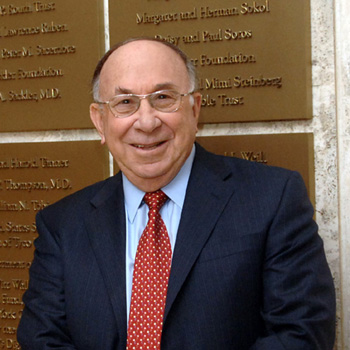Weill Cornell campaign thrives despite recession, says Appel
With just over 20 percent remaining toward the completion of its $1.3 billion fundraising goal, Weill Cornell Medical College is closing in on a successful finish of its historic campaign -- and right on schedule.

Robert J. Appel '53, chair of Weill Cornell Medical College's "Discoveries that Make a Difference" campaign.
"We believe that no other medical college has raised $1 billion in just three and a half years," said Robert J. Appel '53, who serves as chair of the college's "Discoveries that Make a Difference" campaign.
The campaign was launched in 2006 to raise capital for bench-to-bedside translational research in a prominent new research building on the New York City campus, as well as for faculty positions, research endowments and medical student scholarships. Funds raised to date account for a third of Cornell's total campaign, which reached the $3 billion mark on its way toward its $4 billion goal in November.
Appel called Weill Cornell's campaign progress "extraordinary" in the context of the recent recession and cited several reasons for its ongoing success.
"In general, funding for medical research is less cyclical and retains a strong donor base even in tough times," he said. "In addition, the cornerstone of our campaign's goals centers on building a new research facility that will meet the needs of today's and tomorrow's medical researchers."
President David Skorton concurs with Appel's assessment. "What Weill Cornell has been able to accomplish over the last few years -- despite a highly unfavorable economic climate -- has helped maintain momentum for the university campaign and, more important, advance our mission to elevate the level of medical education and care in this country and around the world. The college's success would not be possible without Bob Appel's experience and skill as a fundraiser. He and his wife, Helen, lead by example through their vision and their own outstanding generosity toward our top institutional priorities."
Appel noted that the college's new building will allow the pace of research to accelerate at a time when the outlook for biomedical breakthroughs is especially promising as a result of both advances in life sciences research and computing. It also will be a linchpin for collaborative research among faculty from both campuses, Appel said, noting the growing intercampus relationship between Ithaca and New York City.
"Weill Cornell's biomedical faculty and researchers will work to advance progress toward cures and treatments for diseases that often hold positive outcomes, such as cardiology and cancer," he explained, "but also for diseases with no known cures or effective treatments, such as neurodegenerative diseases like Parkinson's and Alzheimer's."
Other priority areas for the medical college include children's health; diabetes, metabolic disorders and obesity; global health and infectious diseases; stem cell, development biology reproduction and regenerative medicine; and scholarships.
Now under construction on East 69th Street in Manhattan, the building is scheduled for completion in July 2013. When completed, the facility will more than double the center's available space for research, adding 480,000 square feet for research labs, conference rooms and related services and make room for 30 additional medical research scientists.
"It is the translational researchers inside the building who will make 'the medical miracles' happen," Appel said. "They will be among those who translate the mysteries of basic science into pragmatic breakthroughs that will significantly improve human health."
Appel Institute names its first director
Bob and Helen ('55) Appel have given $15 million to the campaign to establish the Appel Institute for Alzheimer's Research, which recently named its first director, Dr. Steven Marc Paul, a professor of neurology and neuroscience and psychiatry. The Appels also gave an additional $15 million toward the new building that will house the center and endowed a clinical scholarship fund.
Private philanthropy has been essential, not an extra, in the building's progress and the establishment of new funds for research programs and faculty, Appel said. In response to whether the facility would be built without philanthropy, he replied "absolutely not."
"Seventy to 75 percent of building funds have been raised through private support. There are no NIH funds. Private funds will also pay off our bond," he added.
Few Cornellians have devoted themselves to both the Ithaca and New York City campuses with as much passion and purpose as the Appels. Besides holding top volunteer leadership roles, they have substantially enhanced education and research for Cornell's students and faculty. They named one of Cornell's main student centers and dining facilities, Appel Commons, and have established notable endowment funds for students and faculty on the Ithaca campus, including scholarships, professorships and other faculty support.
Currently a private investor, Bob Appel was a managing partner and member of the executive committee at Neuberger Berman, an investment and securities brokerage firm in New York City, until his retirement in 2002. In addition to chairing the Weill Cornell campaign, Appel is a Cornell trustee emeritus, a presidential councillor, vice chair of Weill Cornell's Board of Overseers and a member of the Herbert F. Johnson Museum of Art Advisory Council.
Helen Appel serves on the board of trustees for the New York Historical Society and teaches adult education. Like her husband, she is a presidential councillor and a member of the Johnson Museum Advisory Council.
Bob Appel will continue to put his energies into raising the $300 million needed to complete the campaign, with a goal of finishing sometime in 2012. For more information about "Discoveries that Make a Difference," visit www.med.cornell.edu/ways-to-give/.